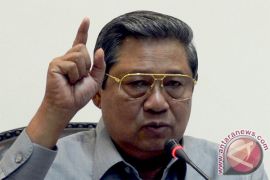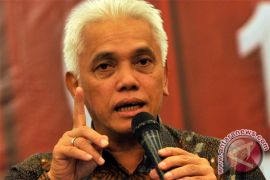"The government still have other ways to avoid raising fuel oil prices, namely by carrying out efficiency and developing new oil and gas refineries," Rizal Ramli said.Jakarta (ANTARA News) - The government need not raise fuel oil prices in the face of increasing burden of the state budget, economic observer Rizal Ramli said.
"The government still have other ways to avoid raising fuel oil prices, namely by carrying out efficiency and developing new oil and gas refineries," Rizal Ramli said here on Wednesday.
Rizal made the remarks in response to the discourse on the government`s plan to raise fuel oil prices.
He said that if the government increased fuel prices it would create great impact on the economy and people. It would generate the rise of various commodity prices and of inflation which eventually also raised the poverty rate.
Rizal who is the founder of the ECONIT Advisory Group explained the management of oil and gas in Indonesia was not yet efficient so that it was still possible to be made more efficient.
He said that the government was still allocating a big fund for subsidy reaching Rp316.1 trillion.
In the 2013 state budget, the subsidy for energy accounted for 274.7 trillion, of which Rp193.8 was subsidy for fuels and Rp80.9 trillion for electricity.
"However, the fuel subsidy is not yet efficient and is still off target," he added.
As an example, he said, the government bought 900,000 barrels per day of fuel from the spot market so that it followed price fluctuations in the international market.
Indonesia bought about 60 percent of fuels for national need. The government should have concluded a long-term work contract with fuel producers, Rizal said.
"The purchase in the spot market has two dollars of price difference per barrel, which is the advantage for importers. This should have been made efficient," he said.
He said that if the two dollars were multiplied with the volume of imported fuels and multiplied with one year, it would account for one billion dollars.
Rizal said that if the government was able to carry out efficiency to minimize unnecessary costs, subsidy would not burden the state budget.
In the meantime, the Institute for Economics and Finance (INDEF) has recommended that the government raise subsidized fuel prices to improve its trade balance and primary deficit in the state budget.
"Indonesia`s fuel oil price is the lowest and subsidy is the highest. Indonesia is an economic socialist country," INDEF economist Didik J Rachbini satirically said in a press conference on Tuesday.
He was giving a press conference in connection with "INDEF`s Quarters Evaluation: Double Interrelation and Inflation."
Besides Didik, another INDEF economist Eko Listiyanto on the occasion explained that Indonesia`s trade balance experienced a deficit in 2012 and early in 2013 because of deficit pressures from increasing oil imports.
Eko said refined oil trade balance had turned "red" because the deficit had reached 24.5 billion US dollars.
He said that the high refined oil imports were an indication of declining oil production at home, while consumption was on the rise.
"Refined oil dominates the total oil and gas imports. In 2012, total oil and gas imports stood at 42.56 billion US dollars and refined oil accounted for 28.68 billion US dollars. In the January - February 2013, total oil and gas imports were recorded at 7.61 billion US dollars. Refined oil accounted for 5.07 billion US dollars," he said.(*)
Editor: Heru Purwanto
Copyright © ANTARA 2013








